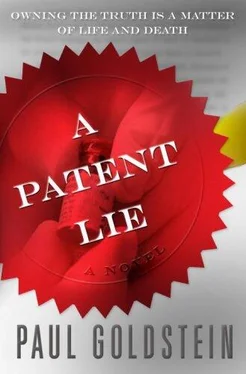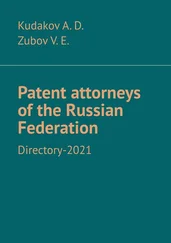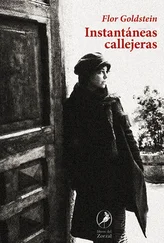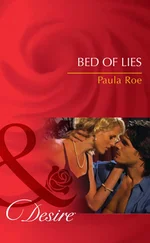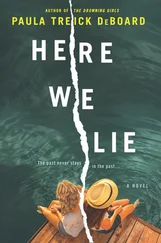Paul Goldstein - A Patent Lie
Здесь есть возможность читать онлайн «Paul Goldstein - A Patent Lie» весь текст электронной книги совершенно бесплатно (целиком полную версию без сокращений). В некоторых случаях можно слушать аудио, скачать через торрент в формате fb2 и присутствует краткое содержание. Жанр: Криминальный детектив, на английском языке. Описание произведения, (предисловие) а так же отзывы посетителей доступны на портале библиотеки ЛибКат.
- Название:A Patent Lie
- Автор:
- Жанр:
- Год:неизвестен
- ISBN:нет данных
- Рейтинг книги:3 / 5. Голосов: 1
-
Избранное:Добавить в избранное
- Отзывы:
-
Ваша оценка:
- 60
- 1
- 2
- 3
- 4
- 5
A Patent Lie: краткое содержание, описание и аннотация
Предлагаем к чтению аннотацию, описание, краткое содержание или предисловие (зависит от того, что написал сам автор книги «A Patent Lie»). Если вы не нашли необходимую информацию о книге — напишите в комментариях, мы постараемся отыскать её.
A Patent Lie — читать онлайн бесплатно полную книгу (весь текст) целиком
Ниже представлен текст книги, разбитый по страницам. Система сохранения места последней прочитанной страницы, позволяет с удобством читать онлайн бесплатно книгу «A Patent Lie», без необходимости каждый раз заново искать на чём Вы остановились. Поставьте закладку, и сможете в любой момент перейти на страницу, на которой закончили чтение.
Интервал:
Закладка:
As they approached the financial district, steel-and-glass office towers crowded the bantam office buildings of another age, and Thorpe, still spilling with stories, pointed out the Monadnock Building where his small firm had its offices. The Art Deco facade shimmered like a mirage in the mirrored sheathing of the office tower opposite it.
Schroeder's was on Front Street, around the corner from Tadich, its fresh blue-and-white facade and gothic heraldry evoking old Bavaria. Inside, pillars lost themselves in the murky heights of the dining room. Waiters scuttled about in the amber light below and there was a faint malty scent about the place. Thorpe ordered his Koenigsberger Klopse and a dry martini. It startled Seeley how just the word “martini” shot adrenaline into his heart. He asked for a steak sandwich, rare, and a glass of water.
When Thorpe started in again about the legendary Jake Ehrlich, Seeley said, “I'm sure this is fascinating, but I could be back in my office preparing for your next witness.”
Thorpe's laugh sounded genuine, but the eyes, wary as ever, told Seeley that there was a point to the story, and that he should listen closely.
“Back then,” Thorpe said, “the really great trial lawyers like Jake had a single ideal: represent your client as shrewdly and strenuously as you humanly can. They played fair, but that was their ideal. They didn't get mixed up with causes. A lawyer today, representing people who care about the environment or abortion or access to medicine, nine times out of ten, he'll sacrifice his client if he thinks it will serve the cause.”
It astonished Seeley that this profoundly immoral man should rebuke him for what he was doing, but the message was unambiguous. Thorpe knew that Seeley had discovered the collusion.
“Jake and the others lived rewarding lives-and long ones.” Thorpe studied his manicured fingers spread out on the table. The nails, bluish at the edges, glowed against the dark, scarred wood. This time, when Thorpe looked up, he was smiling.
Seeley said, “And this is why your courtroom work for St. Gall has been so aggressive.”
If Thorpe caught the irony, he didn't reveal it. “You know how this kind of litigation works, Michael-or do you? For a drug company like St. Gall, every one of its patents represents millions of dollars in R amp;D, hundreds of millions for the blockbusters. So any time a court rules that a patent is invalid-not just a St. Gall patent, but a Vaxtek patent, too-it makes for… let us say, a precedent, a legal climate, that is unfavorable to my client's patents.”
Thorpe waited for the white-aproned waiter to place the cocktail glass in front of him before continuing.
“Today a jury in a San Francisco courtroom holds your client's patent invalid and, who knows, tomorrow, maybe in Boston, or London, or Amsterdam, it will be my client's turn to have its patent struck down.”
Thorpe couldn't expect him to believe that this was how St. Gall plotted its litigation strategy. On this premise, no pharmaceutical company would ever sue for patent infringement.
“If that was your client's strategy, you wouldn't have stipulated priority.”
“As you know”-Thorpe sipped at his martini, but kept his eyes on Seeley-“we have a small problem with a witness on the question of priority.”
“How's that?”
“I know about your lunch with Dr. Warren. That was inappropriate, of course, for you to talk to an adverse witness without going through me.”
“She wasn't an adverse witness when I talked to her.” How did Thorpe know about the meeting? “You'd already dropped her from your list.”
“Well, I suppose we had.” Thorpe looked around the room. Most of the lunch crowd was gone. “What do you think of this place?”
“Very… old world.”
Thorpe tilted his head and gave Seeley a silly grin that didn't fit the haggard features. “Old San Francisco.”
The waiter arrived with the food. Thorpe's Koenigsberger Klopse were two large meat dumplings under a layer of cream sauce mixed with capers. A small mountain of red cabbage crowded one side of the plate, a pile of fried potatoes the other. Thorpe sampled a forkful of dumpling. “This is wonderful. Would you like some?”
Seeley shook his head. He'd had another sleepless night and was exhausted from the morning's cross-examination. Thorpe's winks and grins chafed at him. The dregs in the martini glass looked like salvation.
Seeley said, “I wonder if Jake Ehrlich would have done any of the harebrained things you tell me you've been doing for your client.”
Thorpe's smile disappeared. “At the end of the day, Michael, you're out of your element here, and you would do well to take instruction about this case.” He went back to his meal.
For all of the lawyer's chatter, Seeley realized, Thorpe had said nothing expressly to admit that Vaxtek and St. Gall were colluding, or that he had a part in it.
Thorpe took his time chewing, and when he finished, said, “You think I invited you to lunch to talk about settlement.”
Ten days ago, when they made the lunch date, that had been the object.
“You know,” Thorpe said, “a case can settle at any time-five minutes before the jury returns, or five months before the complaint is even filed.”
“What are you getting at?”
“What I'm saying”-Thorpe was as tired of Seeley as Seeley was of him-“is that you know nothing about this case. What if-and I'm only speaking hypothetically of course-what if this case that you want us to fight like two gladiators has already settled? Say that our clients signed off on it months ago. In that event, we would be no more than actors, you and I. Actors in a charade. We'd do well, wouldn't we, to play the part we've been assigned?”
Seeley said, “Two parties can settle a case, but they can't turn an invalid patent into a valid one.”
“Validity. Invalidity. This is a gray area, a swamp. Wise men stay clear of swamps.” Thorpe speared a home fry. “This is a good time to be wise rather than smart.”
“There's an issue of principle here.”
“No, in my hypothetical case there's only an issue of money, and when the case is over all that will happen is that money will move from one party's bank account to another's-”
“But only because patented vaccines cost more than unpatented ones. What about the millions of AIDS victims in Africa who can't afford AV/AS?”
“Who's talking about AV/AS? This is just a hypothetical situation I'm describing. What you're talking about is international politics. That's way over our heads-who's going to subsidize access to the vaccine, who's going to lobby for condoms, who's going to insist on abstinence. This is way beyond the reach of two trial lawyers.”
“Did you have this little heart-to-heart with Robert Pearsall before he was killed?”
For the first time since he started eating, Thorpe put down his silverware. Two tables away, a head turned. Thorpe's voice was quiet but pitiless. “You know even less about Bob Pearsall than you do about his case. He was a complicated man.”
“Studying philosophy never killed anyone.”
“Then you have forgotten your Dialogues, what Plato had to say about the trial and execution of Socrates.” Thorpe took in Seeley's surprise. “You attended a Jesuit college. Of course you read the Dialogues.”
The old lawyer surveyed the almost empty dining room. “You have also mistaken San Francisco's surface charms for its substance. This city can be a very dangerous place for lawyers who let their ideals get in the way of their pragmatism.”
Seeley said, “We really deceive them, don't we? You, your buddy Jake, and me.”
“Deceive who?”
“We let people think that some lawyers are good, doing their pro bono work, while others just chase after money. But that's only a distraction so that people don't consider the real harm we can do, the corruption, the profound evil that a lawyer can commit.”
Читать дальшеИнтервал:
Закладка:
Похожие книги на «A Patent Lie»
Представляем Вашему вниманию похожие книги на «A Patent Lie» списком для выбора. Мы отобрали схожую по названию и смыслу литературу в надежде предоставить читателям больше вариантов отыскать новые, интересные, ещё непрочитанные произведения.
Обсуждение, отзывы о книге «A Patent Lie» и просто собственные мнения читателей. Оставьте ваши комментарии, напишите, что Вы думаете о произведении, его смысле или главных героях. Укажите что конкретно понравилось, а что нет, и почему Вы так считаете.
